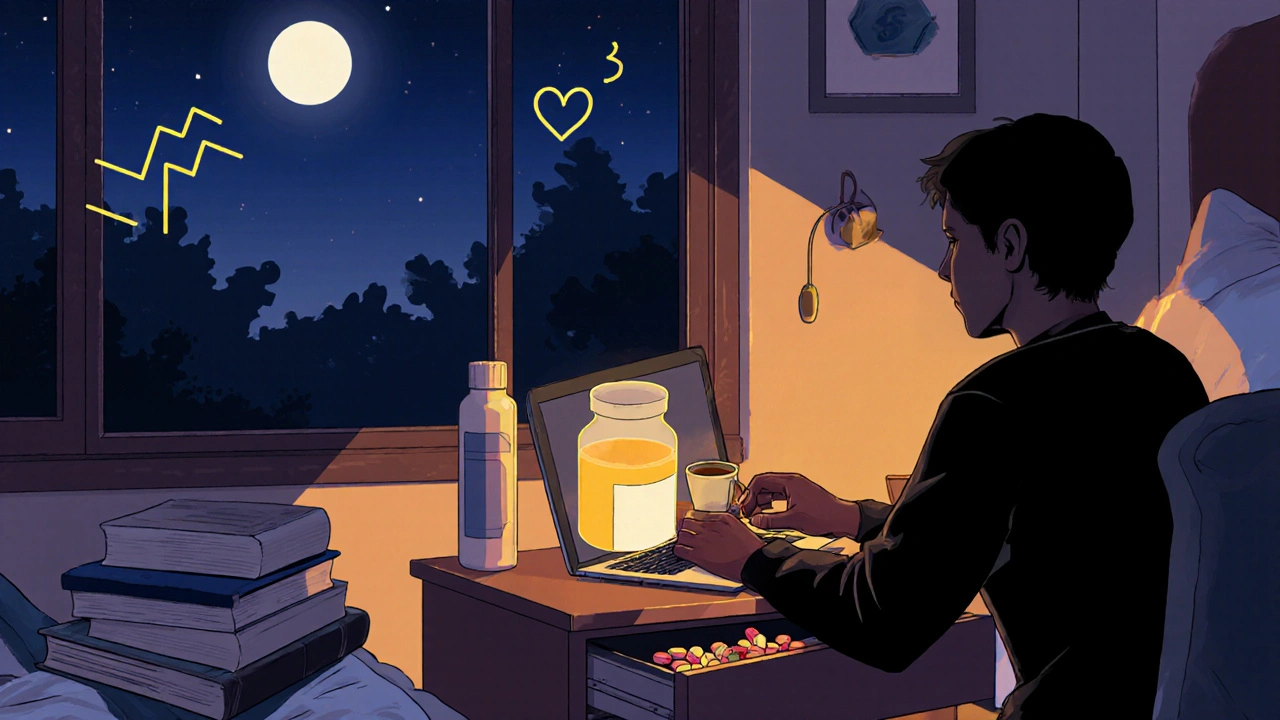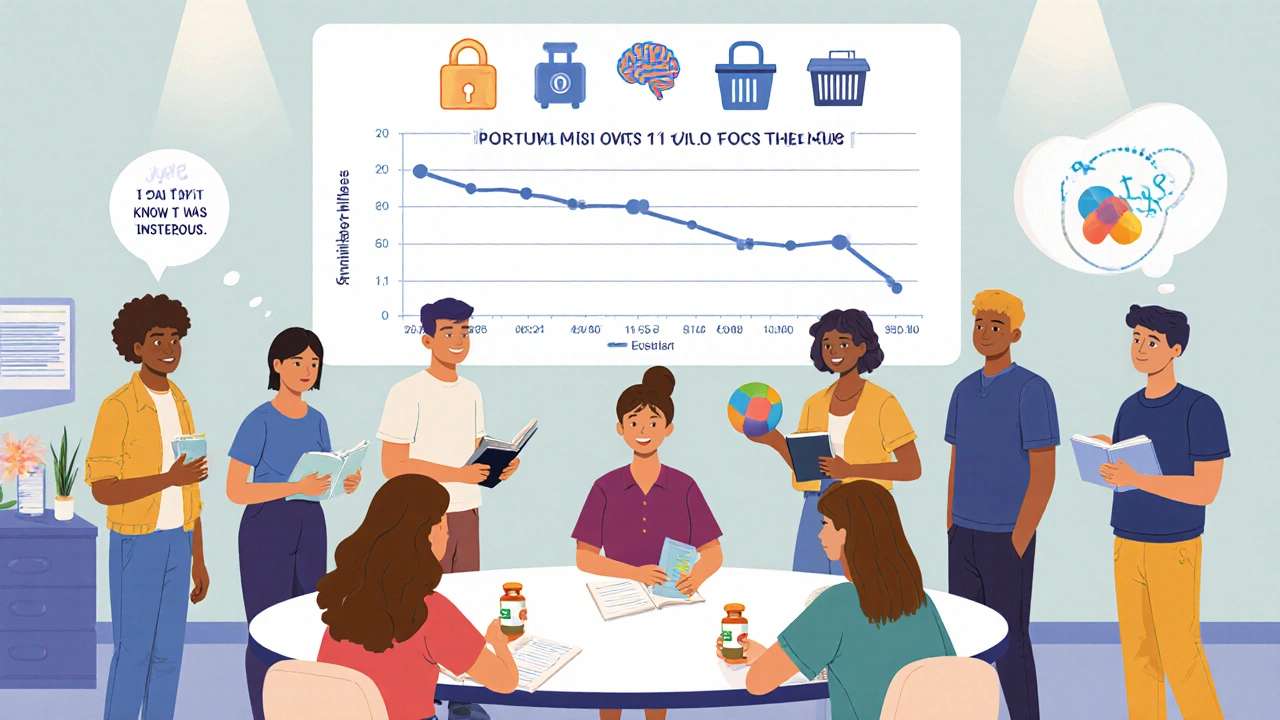Medication Safety for College Students and Young Adults: What You Need to Know
 Nov, 19 2025
Nov, 19 2025
Every year, thousands of college students start the semester with a backpack full of textbooks, a coffee mug, and a prescription bottle they didn’t get for themselves. It’s not unusual. Adderall, Xanax, oxycodone - these aren’t just drugs on a pharmacy shelf. For many young adults, they’re study aids, sleep helpers, or party props. But what seems like a quick fix can turn into a health crisis. Medication safety isn’t just about reading the label. It’s about understanding who you’re sharing with, why you’re taking it, and what happens when you don’t have a prescription.
Why College Students Are at Higher Risk
Young adults between 18 and 25 are the most likely age group to misuse prescription drugs. According to the National Survey on Drug Use and Health, over 13% of college-aged students have used prescription meds without a doctor’s order in the past year. That’s more than double the rate of non-college peers. Why? The pressure to perform is real. Late-night cramming, exams, part-time jobs, and social expectations create a perfect storm. Many students believe that if a drug is prescribed, it’s safe - even if they didn’t get it from a doctor.Stimulants like Adderall and Ritalin are the most commonly misused. Around 75% of all prescription drug misuse among students involves these. They’re seen as cognitive enhancers - the ‘smart drugs’ that help you focus. But here’s the truth: if you don’t have ADHD, stimulants don’t make you smarter. They make you wired. They can cause heart palpitations, anxiety, insomnia, and even panic attacks. Emergency room visits linked to stimulant misuse among 18-25-year-olds tripled between 2005 and 2010.
Painkillers and sedatives aren’t far behind. Students take Vicodin for headaches or Xanax for anxiety before a presentation. But these aren’t harmless. Opioids can lead to dependence. Benzodiazepines can cause memory loss, dizziness, and dangerous interactions with alcohol. And when you’re mixing pills you got from a roommate with beer you drank at a party, you’re playing Russian roulette with your brain and heart.
Where Do These Drugs Come From?
You might think prescription drugs come from shady dealers or online pharmacies. But most of the time, they come from someone you know. A 2021 study of 312 college students found that 60% of misused prescriptions were obtained from friends, roommates, or classmates. It’s not a black market - it’s a shared drawer. Someone gets prescribed Adderall for ADHD, then shares it with a friend who’s stressed about finals. They think it’s harmless. It’s not.At the University of California, a 2020 survey found that 42% of students knew exactly where to get stimulants without a prescription on campus. That’s not a rumor - it’s a fact. And it’s not just about access. It’s about perception. On Reddit’s r/college, students post things like, “Adderall’s passed around like candy before exams.” No one thinks it’s a big deal. But when you take a drug that affects your nervous system without medical supervision, it’s always a big deal.
Who’s Most at Risk?
It’s not just the stressed-out honors student. Men are more likely than women to misuse stimulants - 14.8% of college males reported using Adderall without a prescription, compared to 7.4% of males not in college. But women aren’t immune. They’re more likely to misuse sedatives and painkillers, often to cope with anxiety or trauma. Part-time students are also at higher risk, with 22.5% reporting illicit drug use in the past month, compared to 15% of full-time students.And it’s not just about drugs. Students with untreated mental health conditions - depression, ADHD, anxiety - are far more likely to turn to prescriptions as self-medication. That’s why medication safety isn’t just about pills. It’s about access to counseling, therapy, and academic support. If you’re taking something to feel normal, you’re not alone. But you don’t have to do it alone.

What Happens When You Share or Steal a Prescription?
Let’s say your roommate gives you a few Adderall pills before your midterm. You feel focused. You crush the exam. Sounds good, right? But here’s what you didn’t think about:- You have no idea what dosage you’re taking. Your roommate’s prescription is for 20mg. You took 30mg. That’s dangerous.
- You don’t know if the pills are real. Counterfeit Adderall is flooding campuses. Some contain methamphetamine or fentanyl.
- You’re breaking the law. Possessing someone else’s prescription is a federal offense.
- You’re putting yourself at risk for addiction. Stimulants activate the brain’s reward system. The more you use them without a medical need, the more your brain craves them.
And if you’re caught? Most colleges have disciplinary policies. You could lose your scholarship, face suspension, or get a criminal record. The cost isn’t just health - it’s your future.
What Can You Do to Stay Safe?
Medication safety isn’t about fear. It’s about control. Here’s how to take it back:- Only take meds prescribed to you. Even if it’s your best friend’s. Even if they say it’s “just one pill.”
- Store your meds securely. Keep them in a locked box, not your nightstand. If you’re on a stimulant, keep it away from roommates. Theft and sharing are easy when it’s sitting out.
- Dispose of unused pills properly. Most campuses have drug disposal kiosks. If yours doesn’t, mix old pills with coffee grounds or cat litter, seal them in a bag, and throw them in the trash. Never flush them - they pollute water systems.
- Know the signs of misuse. If you’re sleeping less than 5 hours a night, feeling jittery, having heart palpitations, or suddenly losing interest in things you used to enjoy, it’s time to talk to someone.
- Use campus resources. Most universities now have medication safety coordinators, peer education programs, and free counseling. At the University of Michigan, the ‘Wolverine Wellness’ program cut stimulant misuse by 22% by linking students to academic coaching and mental health support.
What Colleges Are Doing Right
Change is happening. In 2015, only 215 colleges had full medication safety programs. By 2023, that number jumped to 1,472. Schools are installing secure disposal bins, running peer-led workshops, and training pharmacy students to spot at-risk students.The University of Florida’s ‘Safe Meds’ program gave out lockboxes to students and placed disposal kiosks in dorms and health centers. Within two years, stimulant misuse dropped by 18%. Why? Because they made safety easy. No more excuses.
Pharmaceutical companies are also stepping up. Shire, the maker of Adderall, gave $4.2 million to college health programs in 2022. The DEA now requires electronic prescriptions for all Schedule II drugs - meaning forged prescriptions are nearly gone. And the Biden administration just allocated $25 million in new grants for campus drug prevention.
But the most powerful tool isn’t a policy or a kiosk. It’s conversation. Students who talk openly with their peers about medication safety are 40% less likely to misuse drugs. That’s why peer education works better than posters on a wall.

What to Do If You’re Already Misusing
If you’re taking meds you shouldn’t be, you’re not broken. You’re not a bad person. You’re just in a situation that needs support. Here’s what to do next:- Stop cold turkey? No. Stopping stimulants or opioids suddenly can cause seizures, depression, or severe anxiety. Talk to a doctor or campus health provider first.
- Find a counselor. Many universities offer free, confidential therapy. You don’t need a diagnosis to get help.
- Ask about alternatives. If you’re using Adderall to study, try time-blocking, Pomodoro techniques, or academic coaching. If you’re using Xanax for anxiety, try mindfulness apps, breathing exercises, or therapy. These work - and they don’t come with side effects.
- Don’t isolate. Tell one person you trust. A friend, a RA, a professor. You don’t have to fix it alone.
Recovery isn’t about quitting. It’s about replacing bad habits with better ones. And it’s never too late to start.
The Bigger Picture
Prescription drug misuse isn’t just a personal problem. It costs U.S. colleges $1.8 billion a year - in healthcare, lost academic time, and campus security. That’s money that could go toward mental health counselors, tutoring, or housing support. But here’s the good news: when schools combine medication safety with academic and mental health services, misuse drops by up to 40%. That’s not magic. That’s strategy.You’re not just a student. You’re a person. Your brain isn’t a machine that needs a chemical boost. It’s a complex system that needs rest, support, and care. The pressure to be perfect is real. But you don’t need a pill to be enough.
Is it illegal to share my prescription meds with a friend?
Yes. Sharing any prescription medication is illegal under federal law, even if you don’t charge money. It’s considered drug distribution, and you can face fines, suspension from school, or even criminal charges. Your friend may think it’s harmless, but you’re putting both of you at legal and medical risk.
Can I get addicted to Adderall if I don’t have ADHD?
Absolutely. Adderall increases dopamine in the brain, which creates a feeling of focus and euphoria. If you use it regularly without a medical need, your brain starts to rely on it to feel normal. That’s addiction. Studies show that 20-30% of college students who misuse stimulants develop dependence within a year.
Where can I safely dispose of old or unused medications on campus?
Most universities now have drug disposal kiosks in student health centers, pharmacies, or residence halls. If your campus doesn’t, check with local pharmacies - many offer take-back programs. If all else fails, mix pills with coffee grounds or cat litter, seal them in a plastic bag, and throw them in the trash. Never flush them down the toilet or sink.
What should I do if I think my roommate is misusing meds?
Talk to them. Do it calmly, without judgment. Say something like, “I’ve noticed you’ve been up all night and seem really anxious. Is everything okay?” Offer to walk with them to the campus health center. If you’re uncomfortable, talk to your RA or a counselor. You’re not ratting them out - you’re helping them get support.
Are there safe alternatives to stimulants for studying?
Yes. Time-blocking, the Pomodoro Technique (25 minutes focused, 5 minutes break), and regular sleep are more effective than any pill. Exercise boosts focus naturally. Many campuses offer free academic coaching, study skills workshops, and mindfulness programs. These don’t come with heart risks or addiction potential - and they actually build long-term skills.
Is it safe to mix prescription meds with alcohol or energy drinks?
Never. Mixing stimulants with caffeine or energy drinks can cause dangerous spikes in heart rate and blood pressure. Mixing sedatives or painkillers with alcohol can slow your breathing to a stop. This combination is a leading cause of overdose deaths among young adults. If you’re taking any prescription med, avoid alcohol and energy drinks completely.

Gerald Cheruiyot
November 20, 2025 AT 07:11Michael Fessler
November 21, 2025 AT 21:29daniel lopez
November 22, 2025 AT 06:46Nosipho Mbambo
November 23, 2025 AT 13:59Katie Magnus
November 24, 2025 AT 19:51King Over
November 24, 2025 AT 22:47Johannah Lavin
November 25, 2025 AT 10:56Dana Oralkhan
November 25, 2025 AT 17:04Destiny Annamaria
November 26, 2025 AT 19:07